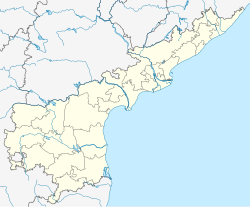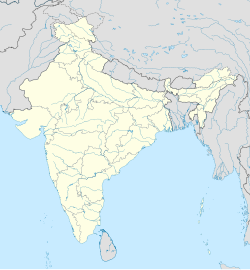Tripuranthakam
Tripurantakam | |
|---|---|
 Dynamic map | |
| Coordinates: 16°0′2.34″N 79°27′22.77″E / 16.0006500°N 79.4563250°E | |
| Country | India |
| State | Andhra Pradesh |
| District | Prakasam |
| Mandal | Tripuranthakam |
| Website | tripuranthakam.com |
| Area | |
• Total | 16.37 km2 (6.32 sq mi) |
| Population (2011)[2] | |
• Total | 10,392 |
| • Density | 630/km2 (1,600/sq mi) |
| Languages | |
| • Official | Telugu |
| Time zone | UTC+5:30 (IST) |
| PIN | 523326 |
| Vehicle registration | AP |
| Website | www.tripuranthakam.com |
Tripuranthakam is a village in Prakasam district of the Indian state of Andhra Pradesh. It is the mandal headquarters of Tripuranthakam mandal in Markapur revenue division.[1]: 16 [3]
According to Shiva Purana, Shiva destroyed Tripurasuras (or, demons ruling three cities) here. After his destruction of the demons and the three cities they inhabited, Shiva was given the name "Tripuranthakeswara" and the place was named "Tripuranthakam". The Sri Parvathi sahita Tripurantakeswara swamy temple is on the top of the hill and houses a secret underground passage to Srisailam from the temple premises. Below the hill inside of a pond is the Bala Thripura Sundari temple. Tripurantaka Bala Tripurasundari Devi (swayambhu) is the first incarnation of Adiparasakthi. She is believed to reside there in the form of a little girl.[citation needed]
References
[edit]- ^ a b "District Census Handbook – Prakasam" (PDF). Census of India. Directorate of Census Operations, Andhra Pradesh. p. 150. Retrieved 27 April 2019.
- ^ "Population statistics". Census of India. The Registrar General & Census Commissioner, India. Retrieved 27 April 2019.
- ^ "Part III, District and Sub-District (Mandals)" (PDF). Census of India. The Registrar General & Census Commissioner, India. pp. 117, 171. Retrieved 27 April 2019.


